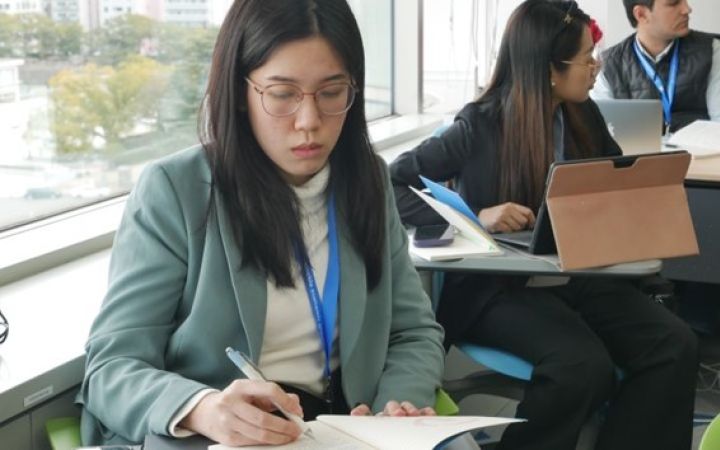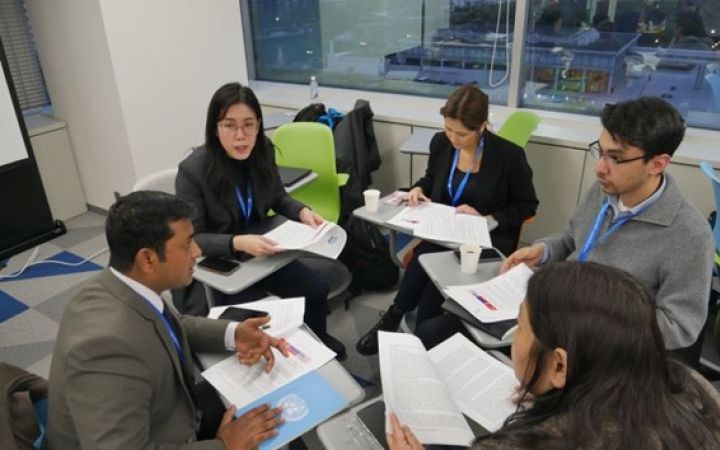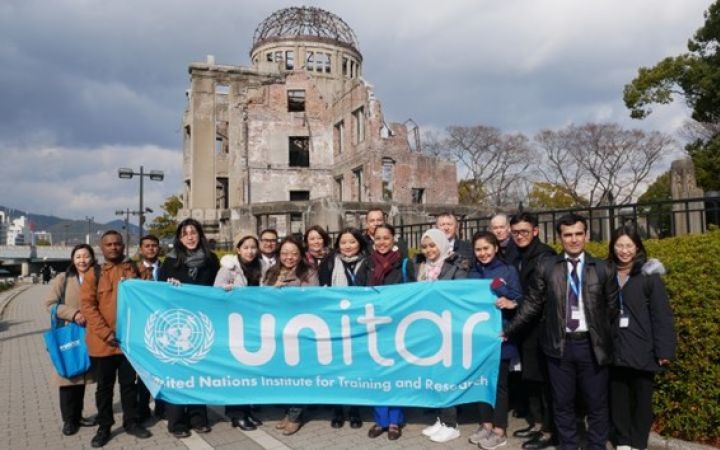- Thai diplomat Manchulika Wongchai participated in the 10th Nuclear Disarmament and Non-Proliferation Training Programme in Hiroshima in February 2025.
- Manchulika highlights the importance of considering the effects of emerging technologies on disarmament.
- What she has learned from this training programme has immensely strengthened her preparation for the Third Meeting of the State Parties to the Treaty on the Prohibition of Nuclear Weapons.
- Manchulika was encouraged by connecting with other diplomats in the region and aims to inspire young people to pursue careers in diplomacy.
26 March 2025 Hiroshima, Japan – Manchulika Wongchai, Third Secretary of the Peace, Security and Disarmament Division of the Department of International Organization of the Ministry of Foreign Affairs of Thailand, was one of the 15 participants of the UNITAR Hiroshima Nuclear Disarmament and Non-Proliferation Training Programme held in February 2025.
Connecting the Dots: Nuclear Disarmament, Rapid Technological Change and Diplomacy
Thailand is committed to nuclear disarmament and was one of the first three countries to sign and ratify the Treaty on the Prohibition of Nuclear Weapons (TPNW) on the first day of its opening for signature. Thailand is also a State Party to the Treaty on the Southeast Asia Nuclear-Weapon-Free Zone (SEANWFZ or commonly referred to as the Bangkok Treaty), which prohibits nuclear weapons in the region with an aim to promote international peace and security.
The Treaty on the Prohibition of Nuclear Weapons entered into force on 22 January 2021 and includes a comprehensive approach to nuclear disarmament. States Parties agree not to develop, possess, stockpile, use or threaten the usage of nuclear weapons. Manchulika says that:
if more countries join the TPNW, we would achieve our common goal of total elimination of nuclear weapons.
Manchulika’s responsibilities relate to the First Committee of the United Nations General Assembly, specifically nuclear disarmament and non-proliferation, as well as cybersecurity and cybercrime within the United Nations framework. She sees the global discussion around disarmament as stagnating, despite the need to account for the rapid advancements in cyber, AI and outer-space technologies that, in her view, “if wrongly used, or used irresponsibly, could pose a serious threat to our international peace and security”.
As part of her job, she must understand the technical details as well as understand the scientific reasons for countries’ positions on nuclear weapons. This can be a challenge, as a diplomatic career means being reassigned from time to time to different fields. Manchulika had to learn quickly after being rotated from her initial position in bilateral relations. In this context, the UNITAR training was immediately useful for her.
The training helped me to connect the dots and see what role Thailand can play in [… this] important mechanism [for nuclear disarmament]. —Manchulika Wongchai, Thai diplomat and UNITAR training programme alumna
THE UNITAR PROGRAMME – Lessons from Hiroshima
Since 2015, the UNITAR Hiroshima Nuclear Disarmament and Non-Proliferation Training programme has been held once a year in Hiroshima with the purpose of honing diplomats’ negotiation skills so they can advocate more effectively for nuclear disarmament and non-proliferation. This year marks the 10th anniversary of the programme, which has long been funded by the Hiroshima Prefectural Government and Hiroshima City and was supported by the UNITAR Association.
In Hiroshima, participants saw how the nuclear bomb impacted – and still impacts – the residents of the city. They visited the Hiroshima Peace Memorial Park and Peace Memorial Museum as well as met with survivors and listened to their testimonials. They engaged with nuclear disarmament experts and officials, non-profit organizations, and atomic bomb survivors in Hiroshima, gaining a full perspective on the history of the city and the consequences of the nuclear weapon. This year’s programme also included a youth session and ended with the diplomats participating in the “International Civil Society Forum to Abolish Nuclear Weapons: 80 Years Since the Atomic Bombing”.
The UNITAR programme allowed Manchulika to deepen her understanding of the humanitarian impact of atomic bombings. At the time of speaking with UNITAR, she was planning to use her new knowledge and skills to prepare for the Third Meeting of the State Parties to the Treaty on the Prohibition of Nuclear Weapons (TPNW), which was held in March 2025.
Another concrete gain for Manchulika was the chance to meet other young diplomats from the Asia-Pacific region who share the goal of advocating for nuclear disarmament. She expected the relationships to continue as they worked together in the region.
I really like engaging with fellow participants, especially my ASEAN fellows. We have this sense of family between us, and I really like to build a network with them because many of us will continue working in this field. It's like a lifelong friendship and professional relationship. —Manchulika Wongchai, Thai diplomat and UNITAR training programme alumna
PATHWAYS TO DIPLOMACY: Inspiring Young People to become Diplomats and Navigating Emerging Technologies
One hope that Manchulika has is to motivate young people to aim for a career in diplomacy. She was inspired by a book written by a Thai diplomat who wrote about dictatorship and post-colonialism. She recommends this career path to young people who wish to broaden their perspectives and support harmonious international relations.
Sometimes as a diplomat you can get lost in your daily lives at work just doing paperwork. But as a diplomat you have to be more mindful and be open-minded to learn new things and not forget what your goals in life are. —Manchulika Wongchai, Thai diplomat and UNITAR training programme alumna
Manchulika believes that more efforts should be made to eliminate the risk of nuclear war, particularly in light of emerging threats from advancing technology. She emphasizes that her country and region should strengthen capacity-building initiatives to ensure that no such risks materialize. She expressed interest in enhancing her knowledge of emerging technologies and their implications for international peace and security, aiming to contribute to foreign policy recommendations that uphold national interests and empower developing countries in an increasingly competitive world.
She hopes to raise awareness in Thailand about atomic bombings in this 80th year commemoration of the Hiroshima bombing and, in the future, to contribute to foreign policy recommendations to safeguard her country’s interests.
UN Volunteer Freya Schischka contributed to this article.
About UNITAR
The United Nations Institute for Training and Research (UNITAR) is a dedicated training arm of the United Nations. In 2023, UNITAR trained over 540,000 learners around the world to support their actions for a better future. UNITAR has a global presence, with offices in Geneva, Hiroshima, New York and Bonn and networks around the world. Find out more at www.unitar.org




